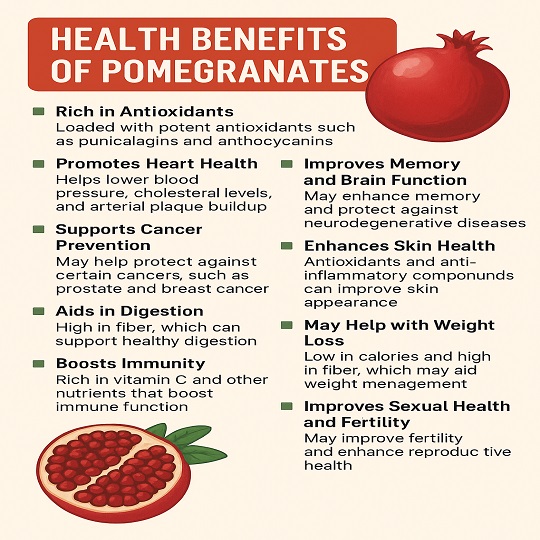
Health Benefits of Pomegranates: A Superfruit for Your Body and Mind
Health Benefits of Pomegranates. Pomegranates have been revered for centuries as a symbol of health, fertility, and eternal life. Often called the “jewel of winter,” this vibrant red fruit is not only delicious but also packed with powerful nutrients. Recent scientific studies have confirmed what ancient civilizations already knew — pomegranates offer a wide range of health benefits. From reducing inflammation to boosting heart health, this superfruit deserves a place in your daily diet.
In this article, we’ll explore the top health benefits of pomegranates, the nutritional value, and how to incorporate them into your diet to improve overall wellness.
1. Rich in Antioxidants
One of the most celebrated benefits of pomegranates is their high antioxidant content. Pomegranates are loaded with polyphenols, especially punicalagins and anthocyanins, which are potent antioxidants that protect cells from damage caused by free radicals.
Why it matters:
Free radicals contribute to aging and chronic diseases such as cancer and heart disease. Antioxidants neutralize these harmful molecules, keeping your cells healthy and functioning optimally.
2. Promotes Heart Health
Cardiovascular disease is one of the leading causes of death worldwide. Consuming pomegranates may significantly improve heart health due to their anti-inflammatory and cholesterol-lowering properties.
How pomegranates help:
- Lower blood pressure: Studies suggest that drinking pomegranate juice can reduce systolic blood pressure by inhibiting angiotensin-converting enzyme (ACE), which tightens blood vessels.
- Improves cholesterol levels: Pomegranates help reduce LDL (bad cholesterol) and increase HDL (good cholesterol).
- Prevents arterial plaque buildup: Regular consumption may prevent the oxidation of LDL cholesterol, which is a key factor in the formation of plaque in the arteries.
3. Anti-Inflammatory Properties
Chronic inflammation is a silent contributor to many serious illnesses, including diabetes, cancer, and Alzheimer’s disease. Pomegranates contain compounds that have strong anti-inflammatory effects.
Key compound:
- Punicalagin, a polyphenol found in pomegranate juice and peel, has been shown to reduce inflammation markers in the body.
4. Supports Cancer Prevention
Emerging research indicates that pomegranates may help prevent certain types of cancer, particularly prostate and breast cancer.
- Prostate cancer: Pomegranate extract has been found to slow the growth of prostate cancer cells and reduce PSA (prostate-specific antigen) levels.
- Breast cancer: The antioxidants in pomegranates can suppress the reproduction of breast cancer cells and even induce apoptosis (cell death) in cancerous cells.
Though more research is needed, these findings are promising.
5. Aids in Digestion
Pomegranates are a rich source of dietary fiber, especially when you consume the seeds (arils). Fiber is essential for maintaining a healthy digestive system and preventing constipation.
Additionally, pomegranates may have a prebiotic effect, encouraging the growth of beneficial gut bacteria.
6. Boosts Immunity
Thanks to their high vitamin C and antioxidant content, pomegranates are a natural way to give your immune system a boost. One pomegranate provides about 30% of the daily recommended intake of vitamin C.
Vitamin C is crucial for:
- Fighting off infections
- Healing wounds
- Enhancing the absorption of iron from plant-based foods
7. Improves Memory and Brain Function
New studies suggest that pomegranate juice can enhance memory and cognitive function. The antioxidants in pomegranate help reduce oxidative stress and inflammation in the brain, which are linked to Alzheimer’s and other neurodegenerative diseases.
In a clinical study, older adults who drank 8 ounces of pomegranate juice daily for four weeks showed improved markers of verbal and visual memory.
8. Enhances Skin Health
Pomegranates can work wonders for your skin, both when eaten and applied topically.
- Anti-aging: The antioxidants help fight signs of aging like wrinkles and fine lines.
- Skin repair: Pomegranate seed oil contains omega-5 fatty acids that regenerate skin cells and promote healing.
- Sun protection: Some research shows that pomegranate extract may reduce skin damage caused by UVB rays.
9. May Help with Weight Loss
Pomegranates are low in calories but high in fiber, making them a great snack for those looking to lose weight. The fiber helps you feel full longer, reducing your overall calorie intake.
In addition, pomegranate juice may help reduce insulin resistance, a factor commonly linked with obesity and metabolic syndrome.
10. Improves Sexual Health and Fertility
Pomegranates have been traditionally used as a natural aphrodisiac, and modern science supports some of these claims. They are rich in nitrates and antioxidants, which help increase blood flow and reduce oxidative stress in reproductive organs.
- In men: Pomegranate may improve sperm quality and testosterone levels.
- In women: It may help regulate hormonal imbalances and support uterine health.
Nutritional Profile of Pomegranates
Here’s what you get in one cup (174 grams) of pomegranate seeds:
| Nutrient | Amount |
|---|---|
| Calories | 144 |
| Fiber | 7 g |
| Vitamin C | 17.8 mg (30% DV) |
| Vitamin K | 28.5 mcg (36% DV) |
| Folate | 66 mcg (16% DV) |
| Potassium | 411 mg (12% DV) |
They also contain small amounts of iron, magnesium, and B vitamins.
How to Add Pomegranates to Your Diet
There are many tasty ways to enjoy this versatile fruit:
- Eat the arils raw as a snack or dessert topping
- Add to salads, grain bowls, or yogurt
- Blend into smoothies or juices
- Use in marinades or sauces for meat
- Sprinkle on oatmeal or cereal
You can also try pomegranate molasses, a thick syrup made from reduced juice, used in Middle Eastern cooking for flavor and health.
Health Benefits of Pomegranates: A Superfruit for Your Body and Mind
Conclusion
Pomegranates are more than just a colorful fruit; they’re a nutritional powerhouse that can significantly improve your health. From reducing inflammation and boosting immunity to protecting your heart and enhancing skin, this ancient fruit offers a wide array of scientifically backed benefits.
Whether you’re drinking its juice, adding the seeds to your meals, or using it in skincare, pomegranates deserve a spot in your daily routine. Try incorporating this superfruit into your diet and experience the health transformation for yourself.
References
- Aviram, M., & Dornfeld, L. (2001).
Pomegranate juice consumption reduces oxidative stress, atherogenic modifications to LDL, and platelet aggregation: studies in humans and in atherosclerotic apolipoprotein E-deficient mice.
The American Journal of Clinical Nutrition, 71(5), 1062–1076.
https://doi.org/10.1093/ajcn/71.5.1062 - Lansky, E. P., & Newman, R. A. (2007).
Punica granatum (pomegranate) and its potential for prevention and treatment of inflammation and cancer.
Journal of Ethnopharmacology, 109(2), 177–206.
https://doi.org/10.1016/j.jep.2006.09.006 - Jurenka, J. S. (2008).
Therapeutic applications of pomegranate (Punica granatum L.): a review.
Alternative Medicine Review, 13(2), 128–144.
https://pubmed.ncbi.nlm.nih.gov/18590349/ - Seeram, N. P., Adams, L. S., Henning, S. M., Niu, Y., Zhang, Y., Nair, M. G., & Heber, D. (2005).
In vitro antiproliferative, apoptotic and antioxidant activities of punicalagin, ellagic acid and a total pomegranate tannin extract are enhanced in combination with other polyphenols.
Journal of Nutritional Biochemistry, 16(6), 360–367.
https://doi.org/10.1016/j.jnutbio.2005.01.006 - Heber, D. (2008).
Multitargeted therapy of cancer by ellagitannins.
Cancer Letters, 269(2), 262–268.
https://doi.org/10.1016/j.canlet.2008.03.053 - Basu, A., & Penugonda, K. (2009).
Pomegranate juice: a heart-healthy fruit juice.
Nutrition Reviews, 67(1), 49–56.
https://doi.org/10.1111/j.1753-4887.2008.00133.x - Shukla, M., Gupta, K., Rasheed, Z., Khan, K. A., & Haqqi, T. M. (2008).
Consumption of hydrolyzable tannins-rich pomegranate extract suppresses inflammation and joint damage in rheumatoid arthritis.
Nutrition, 24(7-8), 733–743.
https://doi.org/10.1016/j.nut.2008.03.012 - United States Department of Agriculture (USDA).
FoodData Central – Pomegranate, raw.
https://fdc.nal.usda.gov/fdc-app.html#/food-details/169134/nutrients - Alzheimer’s Association.
The impact of nutrition and antioxidants on Alzheimer’s and cognitive decline.
https://www.alz.org/help-support/brain_health/healthy_diet - Harvard T.H. Chan School of Public Health.
Pomegranates.
https://www.hsph.harvard.edu/nutritionsource/food-features/pomegranates/




